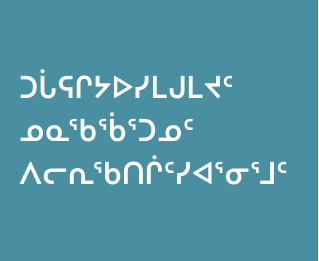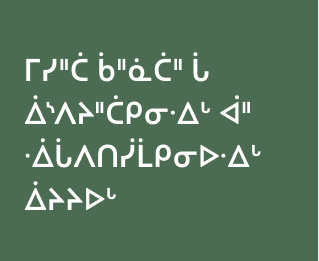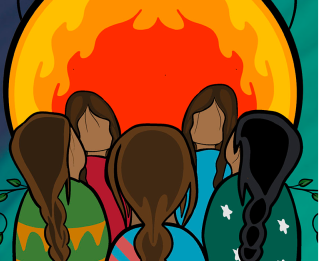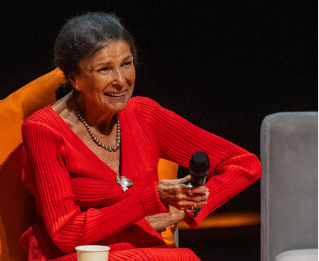Strengthening Relations, Walking Together
2024-2027 National Indigenous Strategy
This strategy is a step in our journey towards truth, reconciliation, inclusion and greater representation of First Nations, Inuit and Métis.
Access the CBC/Radio-Canada National Indigenous Strategy and other documents relating to its implementation.
Our vision
We are mapping out a new way forward with First Nations, Inuit and Métis from coast to coast to coast.
In 2020, we began developing a National Indigenous Strategy to be more intentional when shaping our content by, for and about Indigenous Peoples and improving the representation of First Nations, Inuit and Métis across the organization.
We wanted to improve our capacity to answer calls to action from existing foundational documents about the rights of Indigenous Peoples.

Building and Sustaining Relationships
The National Indigenous Strategy is our collective commitment to examine our content and relationships with Indigenous Peoples, honestly and truthfully.
Learn more about how we plan on changing the way we work and improve our relationships with First Nations, Inuit and Métis.
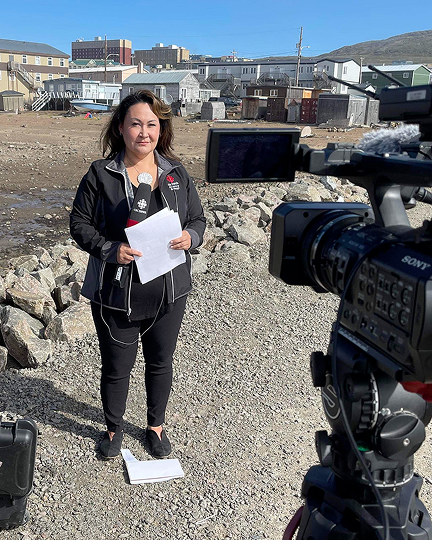
The pillars of the strategy
We demonstrate our unwavering commitment to upholding Indigenous Peoples' rights by actively engaging in four key areas of action:
-
1
Narratives
Grounding principles of the Truth and Reconciliation Commission (TRC) in our stories and content development processes.
More info
Bones of Crows, a CBC/Radio-Canada and APTN series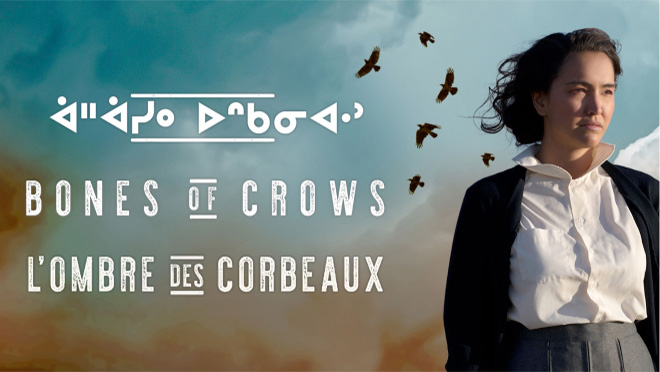
Credit: CBC/Radio-Canada -
2
People
Growing Indigenous representation at all levels of the organization.
More info
All Nations, an employee-led group to connect and support Indigenous colleagues.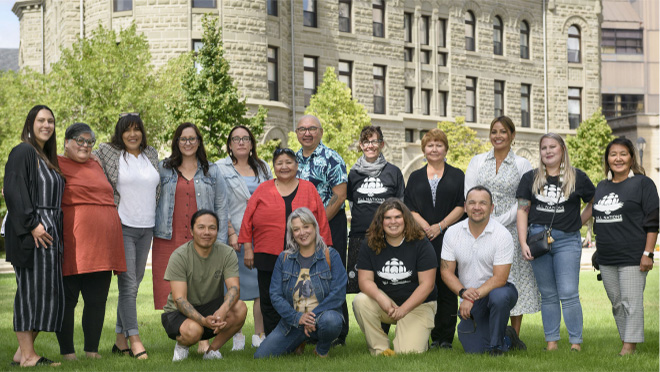
Credit : Doug Little -
3
Relationships
Cultivating good relations with Indigenous Peoples.
More info
Students and CBC Senior Producer Salome Avva host a live, mostly Inuktitut, public call-in radio show in Puvirnituq, a village of about 2,000 people located in Nunavik, in Northern Quebec.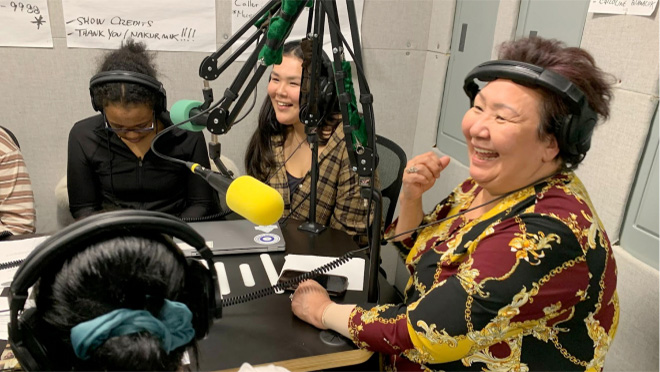
Credit : CBC / Nicola Luksic -
4
Truth And Reconciliation
We will take meaningful actions toward reconciliation.
More info
Members of the Métis delegation gathered in St. Peter's Square at the Vatican shortly before their meeting with the Pope to discuss Canadian residential schools.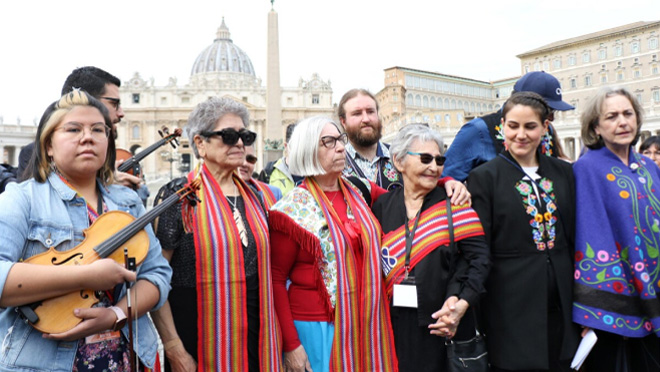
Credit : Radio-Canada / Marie-Laure Josselin
Engaging Indigenous Peoples with open hearts and minds
In 2022, while developing this strategy, CBC and Radio-Canada met with First Nations, Inuit and Métis leadership, audience members, staff, content creators and other movers in the media industry. Perspectives and wisdom were shared on how we could better represent and reflect Indigenous cultures, interests and needs.
Read our blog update - The Journey Forward.
- April 26, Winnipeg (MB)
- May 31, Saskatoon (SK)
- June 9, Yellowknife (NT)
- June 27, Vancouver (BC)
- June 29, Whitehorse (YT)
- July 12, Iqaluit (NU)
- July 18, Membertou First Nation (NS)
- July 19, Halifax (NS)
- August 3, Edmonton (AB)
- August 16, Kahnawake (QC)
- August 30, Ottawa (ON)
- September 6, Toronto (ON)
- September 14, St. John's (NL)
- September 27, Thunder Bay (ON)
- June 15, Val-d'Or (QC)
- August 13, Montreal (QC)
- August 14, Montreal (QC)
- August 23, Sept-Îles (QC)
Building upon progress:
Over the years, we have reached important milestones in our commitment to serving Inuit, Métis, and First Nations, and today, we are building our efforts on the solid foundation we have established.
If you or someone you know should be featured, or if you have photos to share, write to us at indigenous.strategy@cbc.ca.
1958
CBC opens its Northern Service.
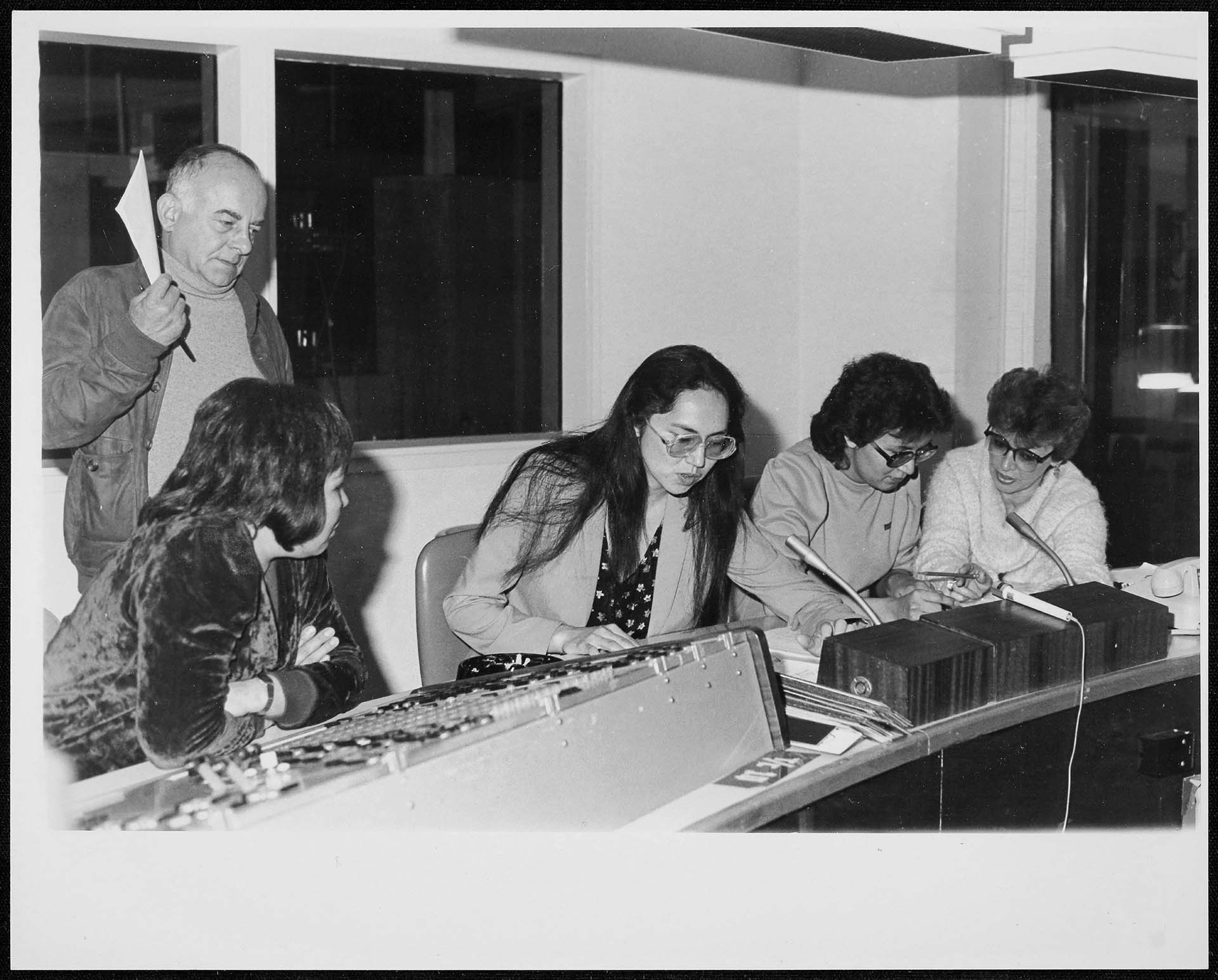 Serge Gagné, standing, Gloria Kitty, bottom left, Edna Voyageur, 2nd left bottom, Dianne Ottereyes Reid, 2nd right bottom and an unnamed producer, right, in an undated photo.
Serge Gagné, standing, Gloria Kitty, bottom left, Edna Voyageur, 2nd left bottom, Dianne Ottereyes Reid, 2nd right bottom and an unnamed producer, right, in an undated photo. Credit: CBC North
1960
The first Inuit and Dene broadcasters are hired by CBC, and Indigenous language services begin for the North..
1965
Our Native Land begins airing on CBC Radio. The first national radio program focused on Indigenous issues and cultures, Our Native Land chronicled the rejuvenation of Indigenous literature, art, culture and political activism on Saturday afternoons until 1985. Hosts included Johnny Yesno, Bernelda Wheeler, Albert Angus and Brian Maracle, who were part of the all-Indigenous production team.
1972
CBC Northern Services in Quebec begins broadcasting short Cree-language segments during its Inuktitut-language programming. Inuk broadcaster, the late Elijah Menarik, is believed to be the first person to use the Cree-language on the airwaves of CBC. He learned his Cree on Fort George Island, Que., after running away from a residential school there and living with a Cree family for two years.
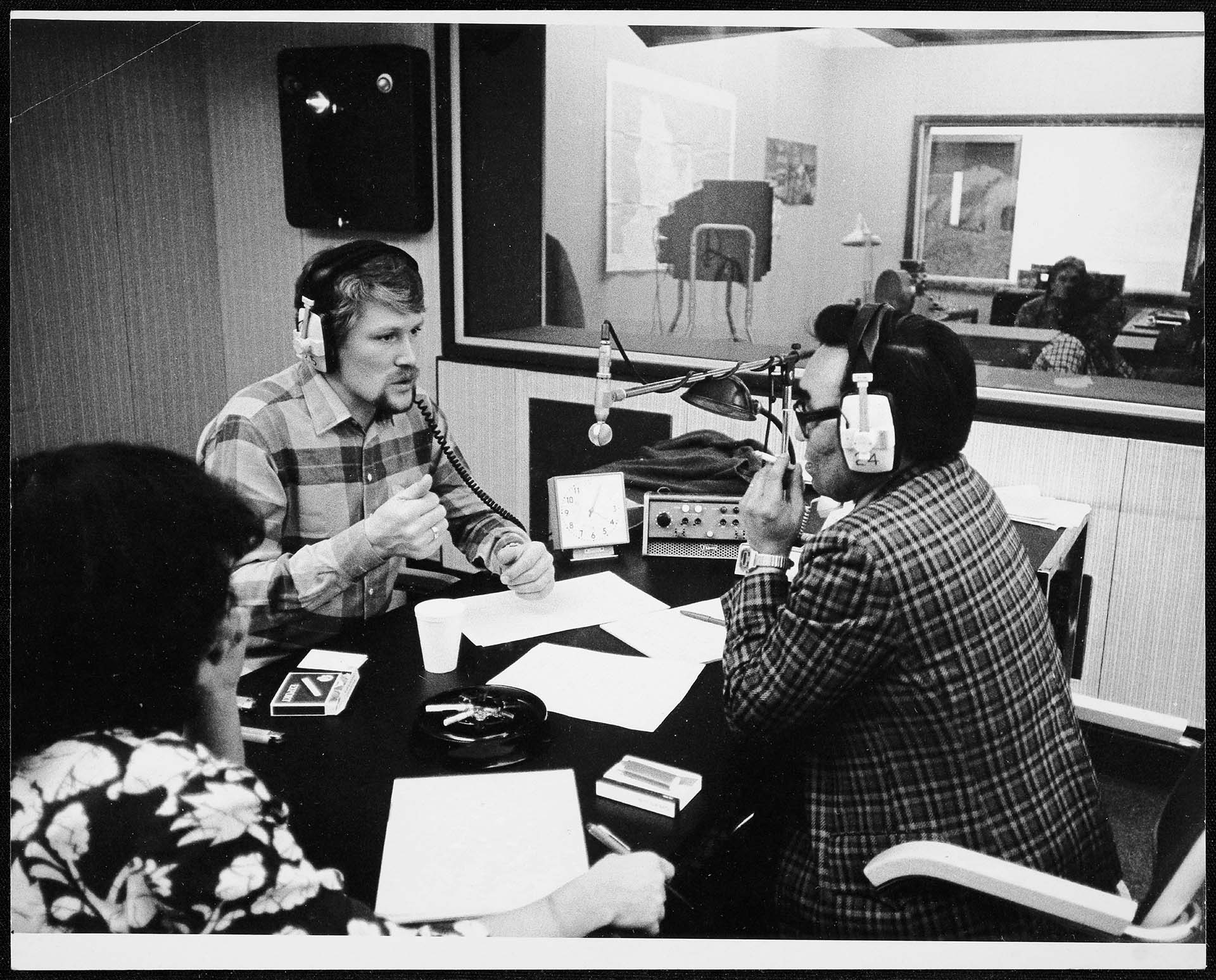 Northern Service: the President of the Inuit Circumpolar Conference, Hans-Pavia Rosing is interviewed by host Elijah Menarik.
Northern Service: the President of the Inuit Circumpolar Conference, Hans-Pavia Rosing is interviewed by host Elijah Menarik.Bernelda Wheeler becomes one of the hosts of CBC Radio's Our Native Land. She works on the program until 1982, wearing various hats as a producer, investigative journalist, writer and becoming known as "the First Lady of Indigenous Broadcasting".
Anik 1, 2 & 3 satellites launch. Canada becomes the first country in the world to use satellites for domestic communications. CBC/Radio-Canada radio transmission expands throughout the North. Largest northern centres also begin to receive television signals from southern CBC/Radio-Canada transmissions.
1973
Myra Cree becomes the first woman in the history of Radio-Canada to host the evening news.
1974
Indigenous broadcasters are hired and trained by CBC for daily radio and television coverage of the Berger Royal Commission Inquiry into a Mackenzie Valley Gas Pipeline. Joe Tobie, Louie Blondin, Jim Sittichinli and Abe Okpik, produced by Whit Fraser, become Indigenous language broadcast pioneers.
1975
Tarqravut — Inuktitut for Our North — a weekly Inuktitut-language program produced in Montreal and later Ottawa is launched by CBC. The program runs until 1988, when it is replaced by Aqsarniit.
1979
CBC Northern Services opens an Inuktitut-language radio station in Rankin Inlet, Nunavut.
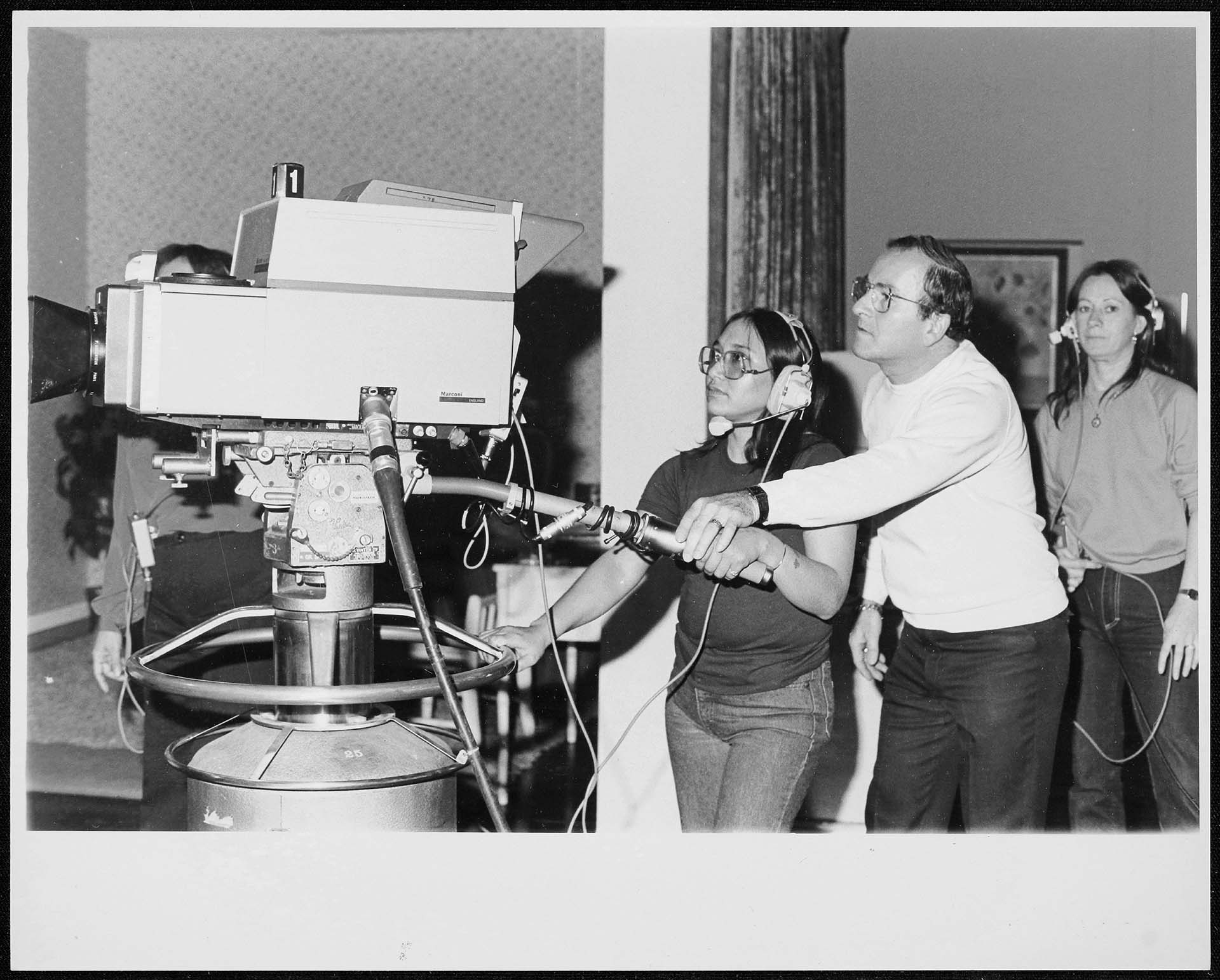 Northern Service: Helen Atkinson is at the camera.
Northern Service: Helen Atkinson is at the camera.The CBC Northern Services program unit based in Montreal is expanded to serve James Bay Cree and Inuit communities in Northern Quebec.
CBC Northern Services begins seasonal English and Indigenous language television production in Yellowknife, Northwest Territories.
1980
A transmitter-sharing agreement is signed by CBC Northern Services and Inuit organization Taqramiut Nipingat to support a network of correspondents in the 14 Inuit communities of Quebec.
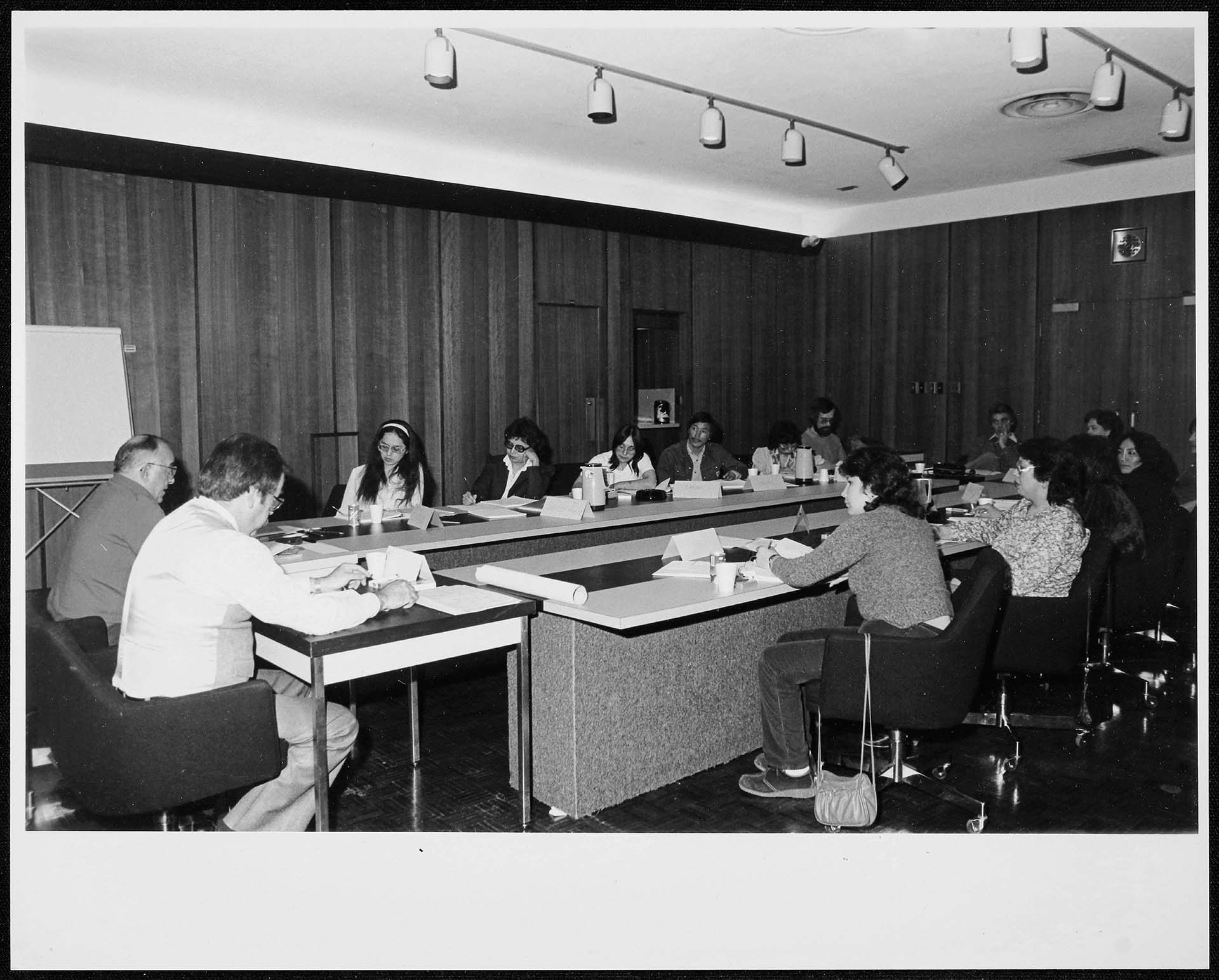 Northern Service: Representatives of the Cree and Inuit communities meet with the Northern Service.
Northern Service: Representatives of the Cree and Inuit communities meet with the Northern Service.1981
Gloria Kitty-Pérusse, the first Cree woman employee, is hired by CBC Northern Quebec Service as a permanent announcer-operator.
CBC Northern Quebec Service publishes a repertoire of First Nations and Inuit songs collected from Northern Quebec on cassette, 33 rpm vinyl disk, and 7-inch tape.
1982
Focus North, the first weekly television pan-northern current affairs program, is launched by CBC Northern Services and serves Yukon, Northwest Territories, and northern Quebec.
Maamuitaau, a weekly television magazine program in Cree, debuts on CBC Northern Quebec Sevice for the first time on November 10, 1982.
1983
CBC Northern Service & CBC Network co-produce northern Canada's first ever live television election program, from Yellowknife, Northwest Territories, in English with Indigenous language inserts.
1985
William Tagoona and Alec Gordon are the first two persons hired by CBC Northern Services to start an Inuktitut language radio bureau in Kuujjuaq, Nunavik.
1986
To enhance the pan-northern program Focus North's coverage of the Yukon, northern British Columbia and Alaska, CBC Northern Services opens a television production bureau in Whitehorse.
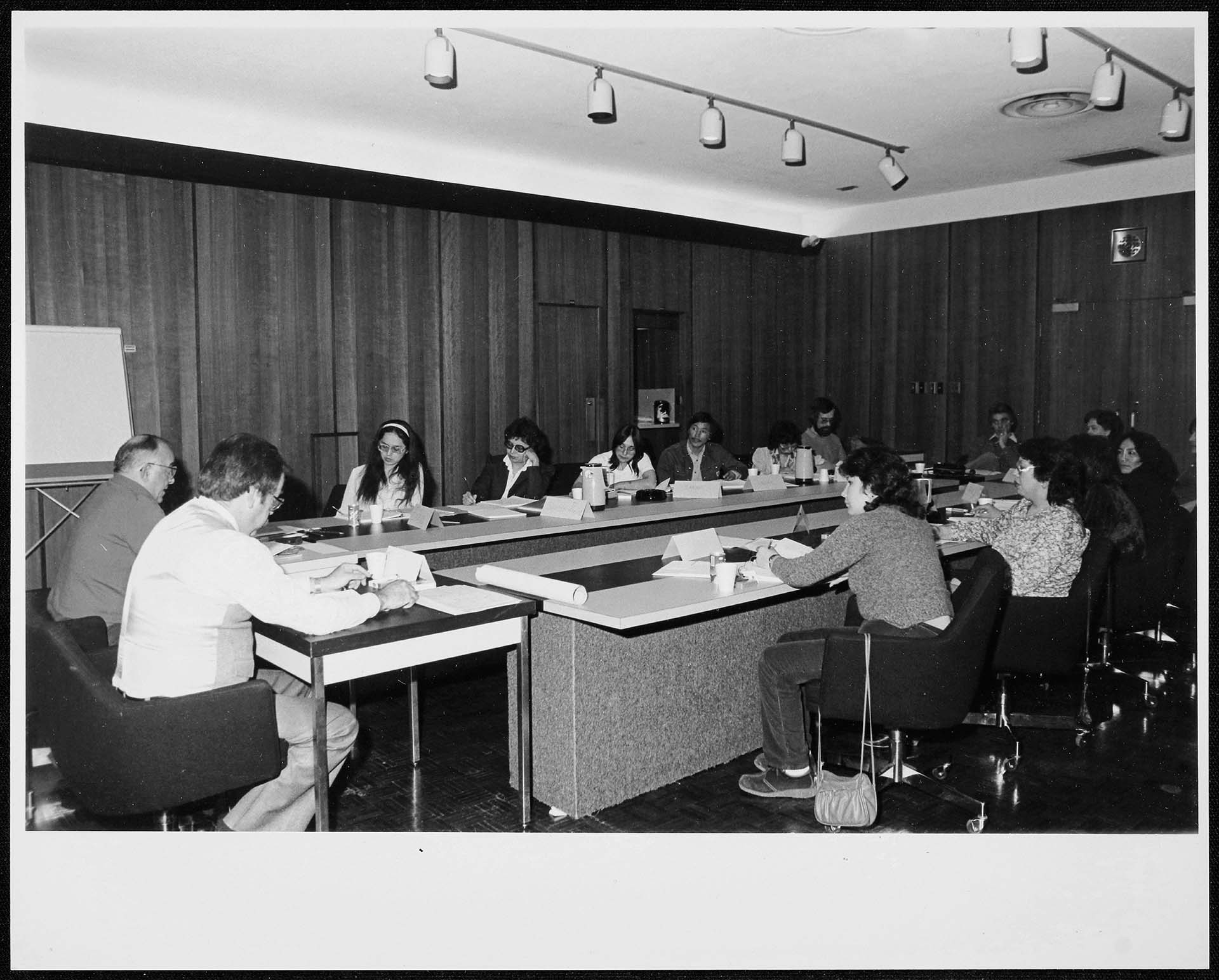 Northern Service: Ted Moses (standing up)
Northern Service: Ted Moses (standing up)Boréal Hebdo a weekly radio show in French about the lives of Indigenous people and the people living in Northern Quebec debuts on CBC. On September 6, 2015, it becomes a daily show called Soirée Boréale.
1992
CBC Northern Services moves its regional headquarters from Ottawa to Yellowknife. First northern-based director for the region officially changes regional name to CBC North. Andrew Cowan is Northern Services' first Regional Director, Austin Curly is the Assistant Regional Director, Fran Cutler is Radio Programming Director and Whit Fraser is news reporter.
1995
Launching northern Canada's first-ever daily television news programs, CBC North introduces Northbeat in English, co-hosted by Paul Andrew (Dene) and George Tuccaro (Cree), and Igalaaq in Inuktitut, hosted by Rassi Nashalik (Inuk).
True North Concert from Rankin Inlet, hosted by CBC North, becomes the first one nationally televised to showcase northern cultures, languages and performers to all of Canada.
1998
Arctic Winter Games is broadcast on network television for the first time by CBC North, bringing unique Arctic traditional sports and cultural performances to all of Canada.
2004
The Prairie Aboriginal Content Unit (Saskatchewan, Manitoba and Alberta) is created by CBC to develop Indigenous storytelling content for both radio and television.
New Voices the CBC Radio's strategy which enabled thousands of new voices and points of view to be aired on programs such as Outfront, Global Village, and Legends, focuses on safeguarding endangered Indigenous languages through voice recordings.
2007
A one-day conference, Aboriginal Matters, in Regina, brings together more than 20 CBC Indigenous journalists and senior News management to share successes and challenges in covering Indigenous issues.
2008
CBC Radio commissions The Journey (Pimooteewin), the first opera in the Cree language, a collaboration between Tomson Highway and Melissa Hui.
2012
8th Fire: Aboriginal Peoples, Canada & the Way Forward premieres on CBC. Hosted by Winnipeg-based journalist Wab Kinew, the four part documentary explores Indigenous/non-Indigenous relations in Canada.
2013
Radio-Canada International (RCI) relaunches as a digital-only platform with a new section of this site, Autochtones, l'autre histoire.
2016
CBC Aboriginal changes its name to CBC Indigenous.
CBC begins its Indigenous Languages archives project to digitize over 75,000 hours of original language audio content from CBC North.
Missing & Murdered, a new CBC podcast and web series hosted by CBC News investigative reporter Connie Walker is launched. The first season looks at the unsolved cold case of Alberta Williams, a young Indigenous woman who was murdered in northern British Columbia. The second season joins a family as they search for their sister Cleo Semaganis Nicotine.
Espaces autochtones, a web and mobile portal dedicated to Indigenous matters, is launched by Radio-Canada.
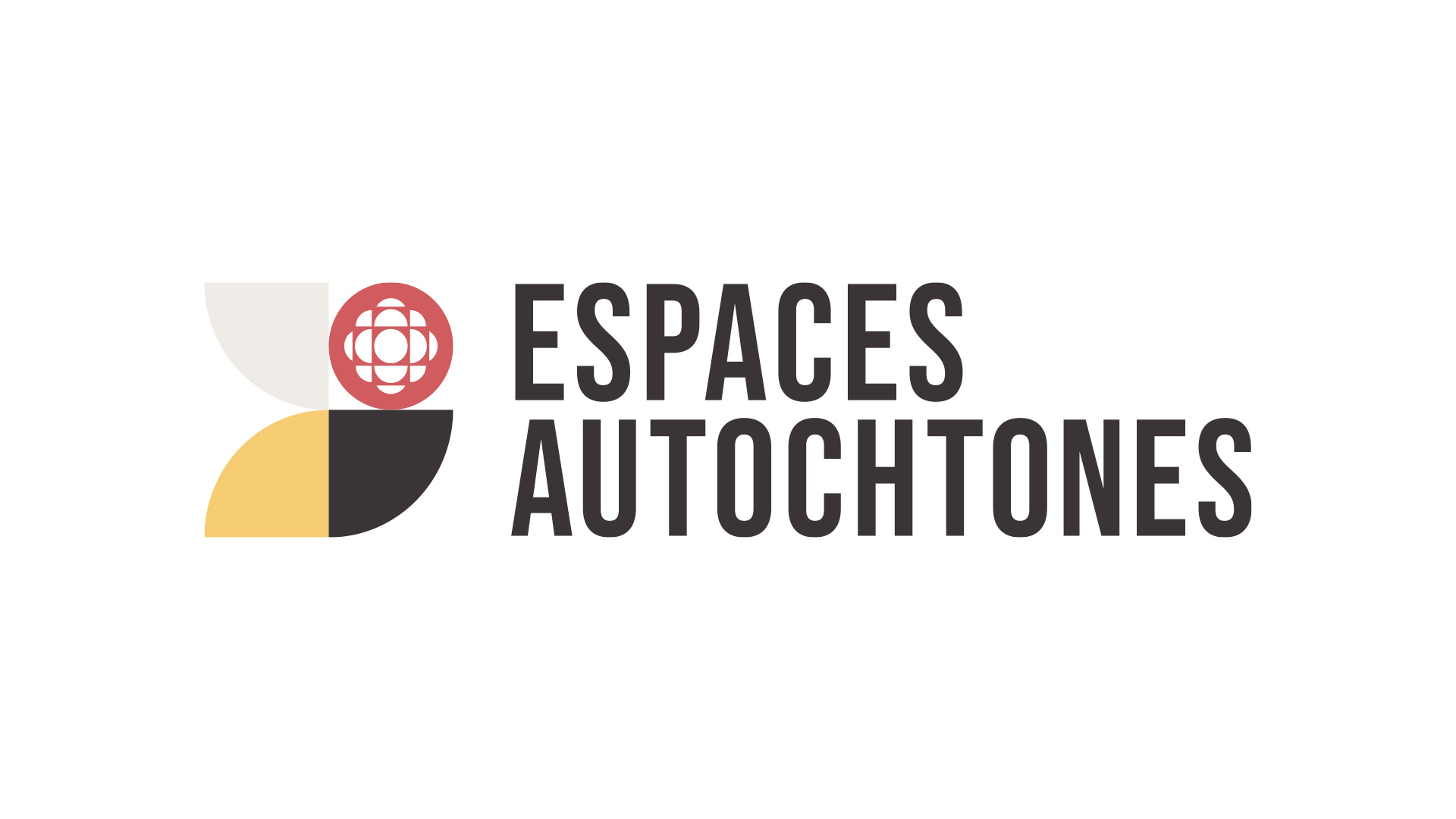 Espaces Autochtones
Espaces Autochtones2018
Radio-Canada launches ICI Grand Nord.
Radio-Canada establishes the Bureau autochtone mobile (BAM), a project committed to hiring Indigenous journalists that ensures voices from Indigenous communities are heard on all platforms.
CBC Indigenous launches Beyond 94, which measures Canada's progress in addressing the Truth and Reconciliation Commission's 94 Calls to Action. A team effort between the Indigenous Unit, CBC Saskatchewan, CBC Manitoba and CBC North.
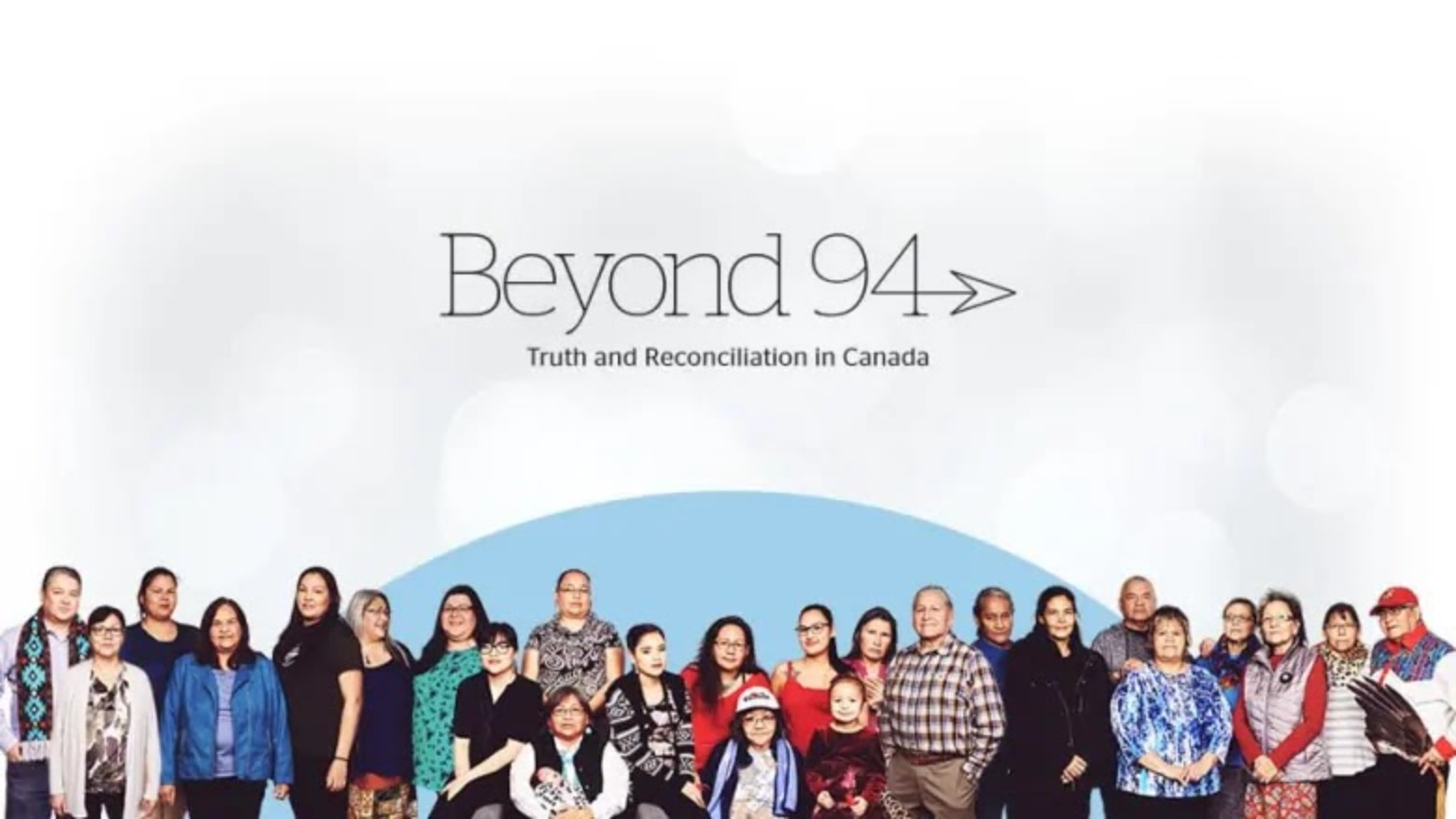 Beyond 94, a team effort between the Indigenous Unit, CBC Saskatchewan, CBC Manitoba and CBC North.
Beyond 94, a team effort between the Indigenous Unit, CBC Saskatchewan, CBC Manitoba and CBC North.2019
Radio-Canada broadcasts ADISQ's inaugural Indigenous artist of the year award at the annual televised gala.
2020
Radio-Canada launches Laissez-nous raconter : L'histoire crochie, a podcast that explores words whose meanings have been twisted by centuries of colonization. CBC's English adaptation Telling Our Twisted Histories is released in 2021.
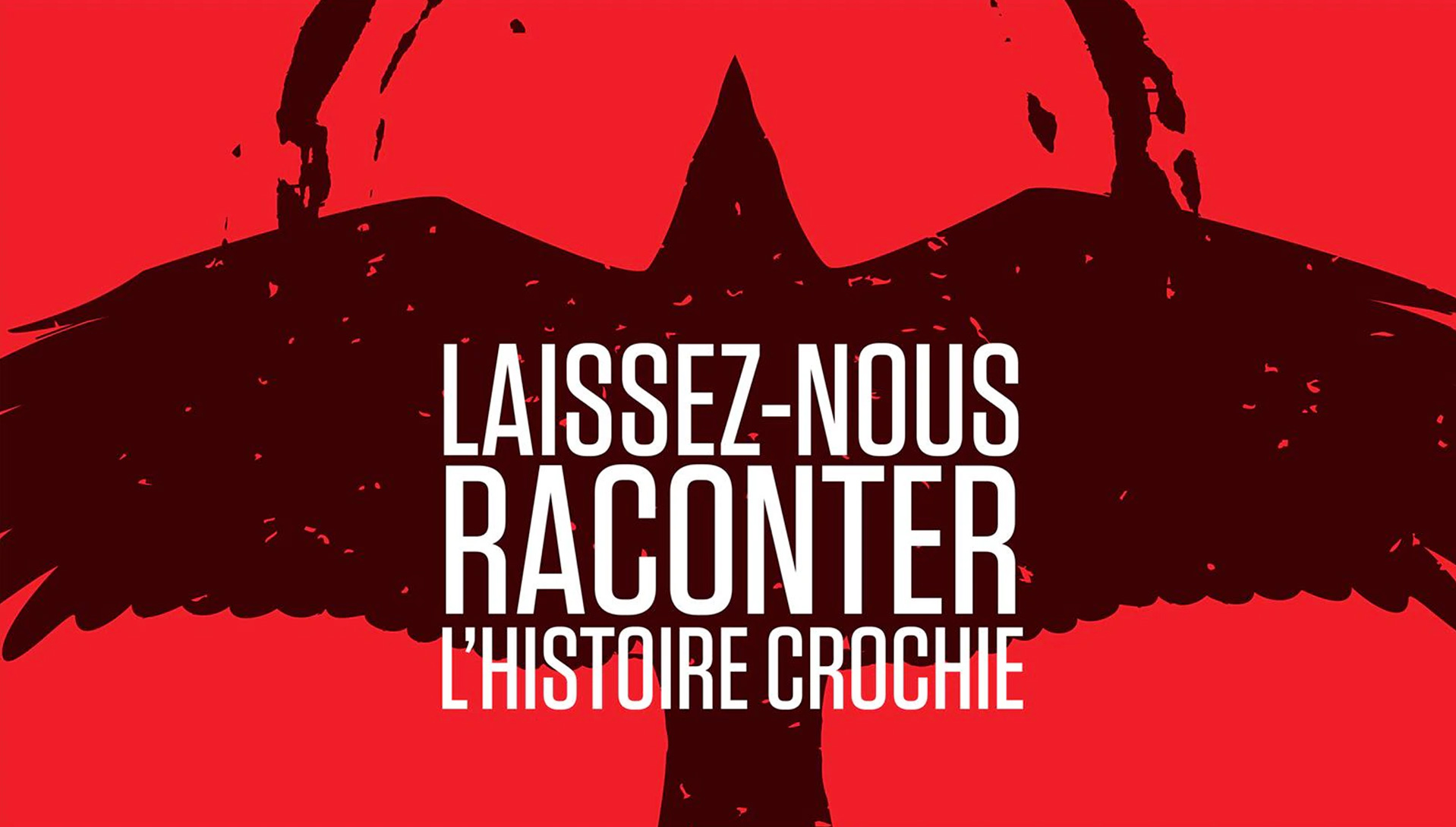 Telling Our Twisted Histories
Telling Our Twisted Histories2021
CBC live broadcasts the gold medal hockey game in Inuktitut and Eastern Cree at the Tokyo Olympics.
Radio-Canada launches its first Indigenous radio program Kuei! Kwe! on ICI PREMIÈRE with host Melissa Mollen Dupuis.
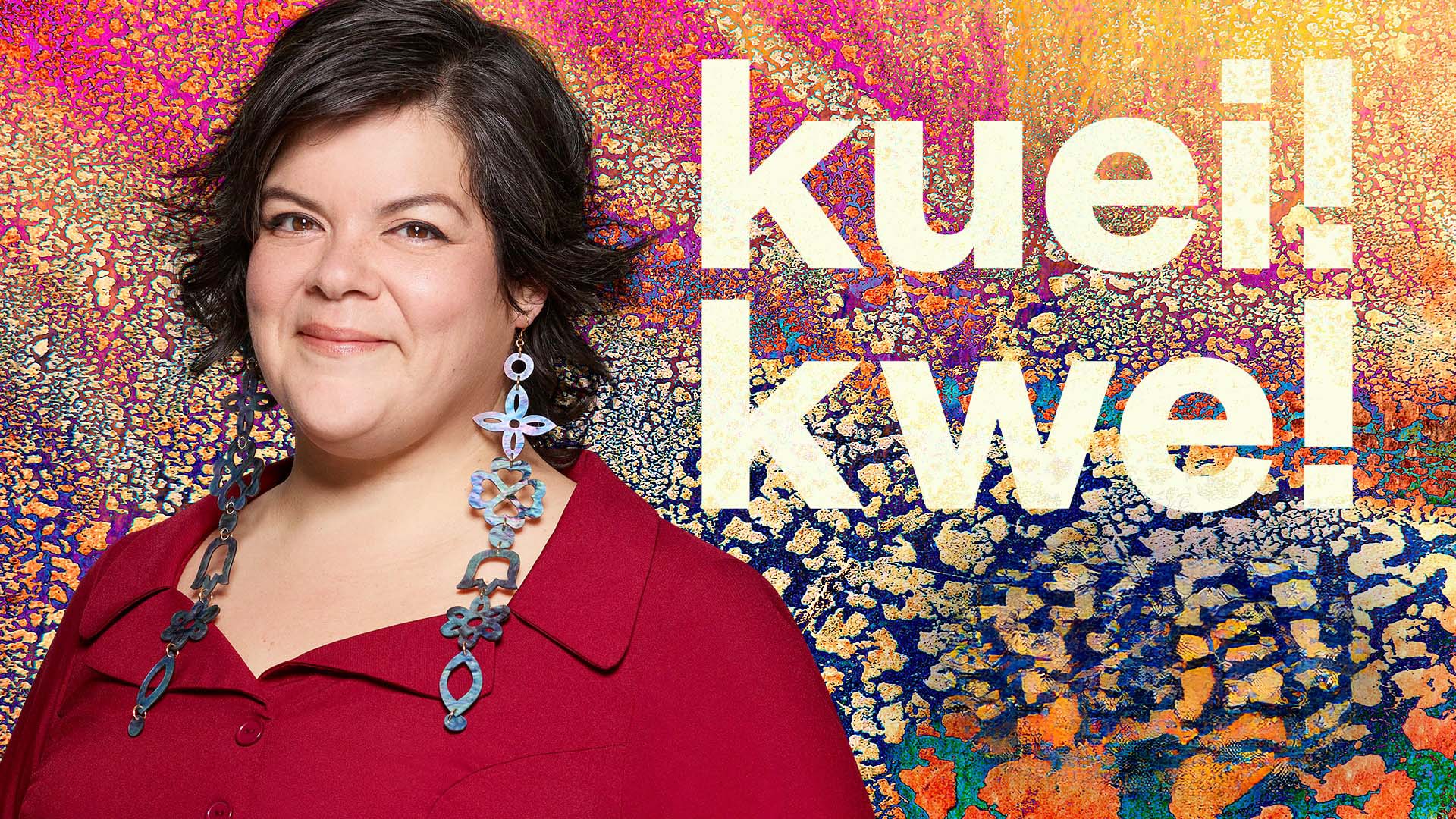 Kuei! Kwe! with Melissa Mollen-Dupuis.
Kuei! Kwe! with Melissa Mollen-Dupuis.2022
CBC/Radio-Canada signs first Memorandum of Understanding (MOU) with APTN to foster greater collaboration, sharing of resources, and coproductions.
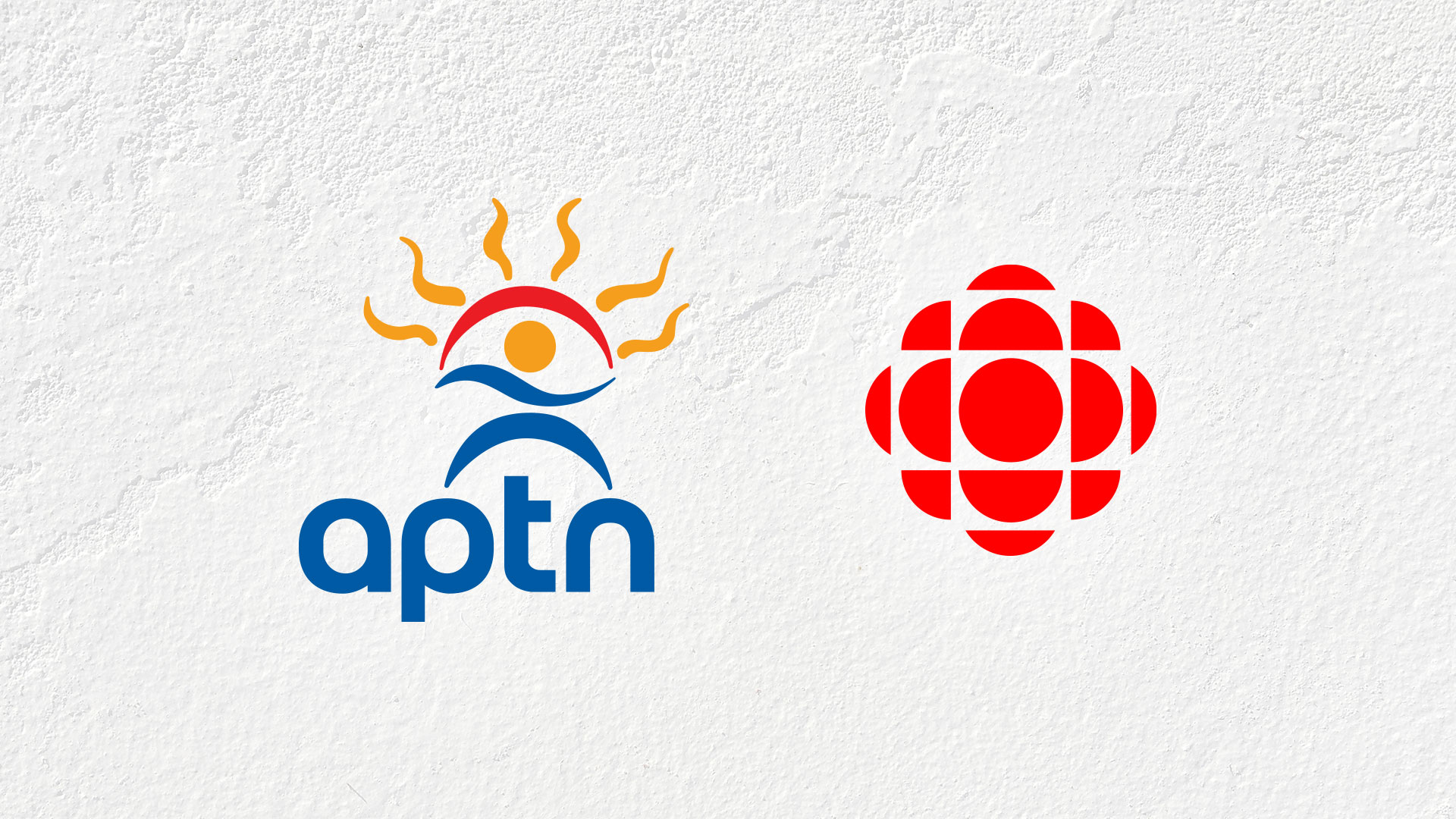 APTN and CBC/Radio-Canada announce a new collaboration.
APTN and CBC/Radio-Canada announce a new collaboration.Radio-Canada releases Pour toi Flora, the first fictional drama written, directed and produced by Indigenous creators for a major French-language network, which went on to win multiple awards.
Radio-Canada airs its television special Le Grand Solstice where music of all kinds, central to the cultures of Indigenous Peoples, is celebrated.
2023
CBC wins 12 awards at the Indigenous Journalists Association conference held in Winnipeg.
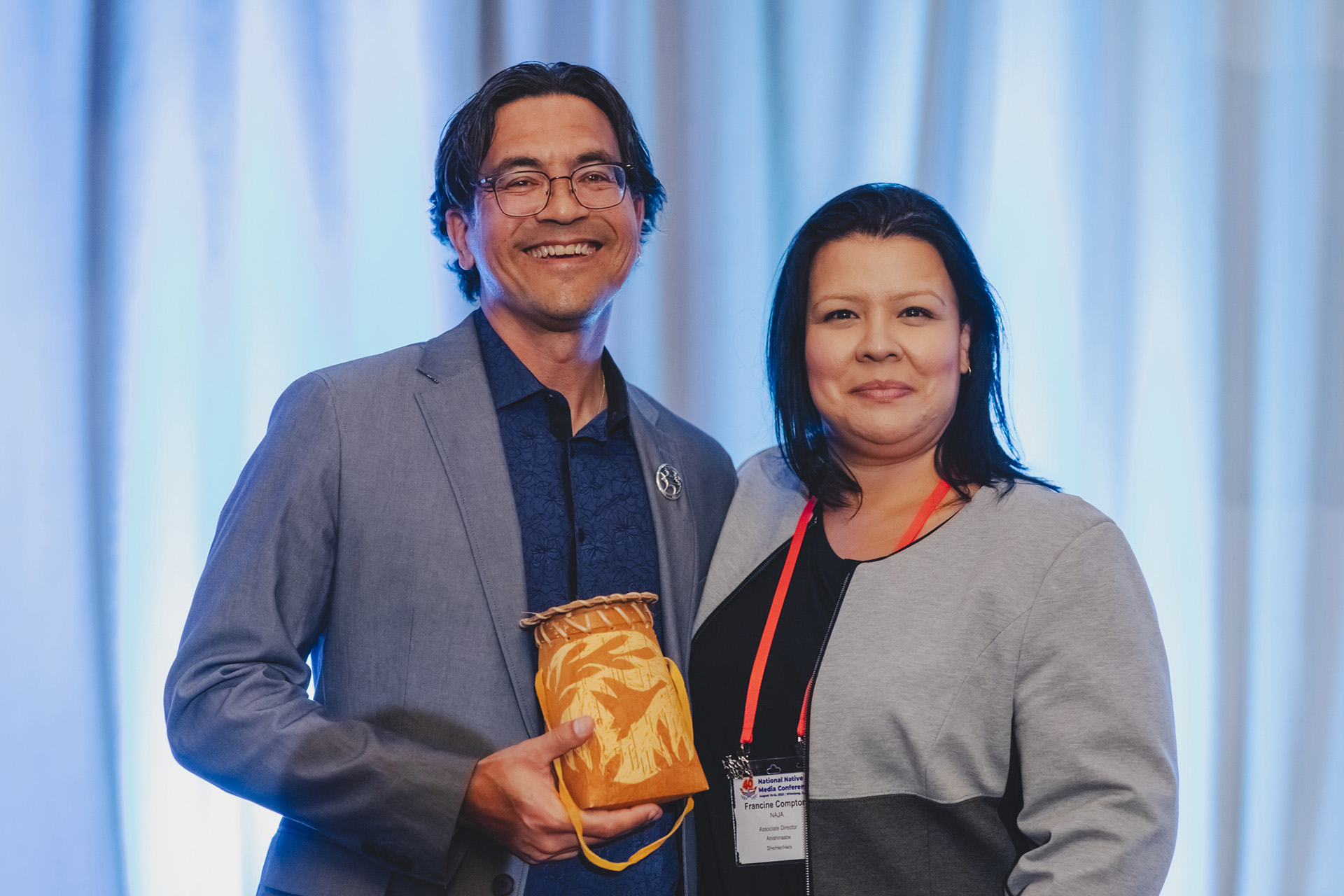 Former CBC Employees Duncan McCue and Francine Compton at NAJA.
Former CBC Employees Duncan McCue and Francine Compton at NAJA.CBC, Radio-Canada and APTN launch Bones of Crows by Indigenous filmmaker Marie Clements, a first ever miniseries produced in English, French and Cree.
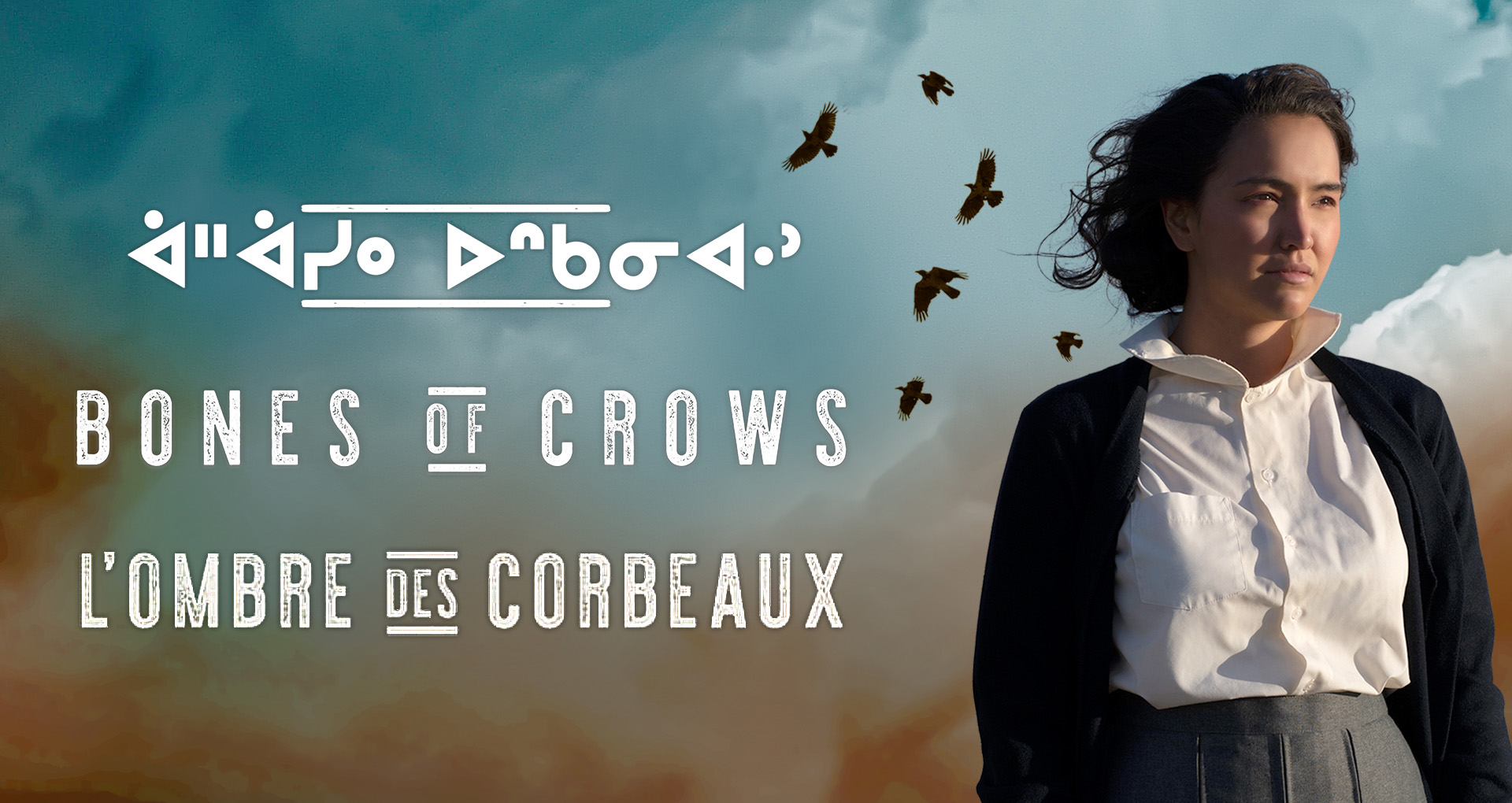 Bones of Crows, a CBC/Radio-Canada and APTN series
Bones of Crows, a CBC/Radio-Canada and APTN seriesRadio-Canada's Bureau autochtone mobile (BAM) changes its name to Résonance.
2024
CBC/Radio-Canada launches first-ever National Indigenous Strategy.

